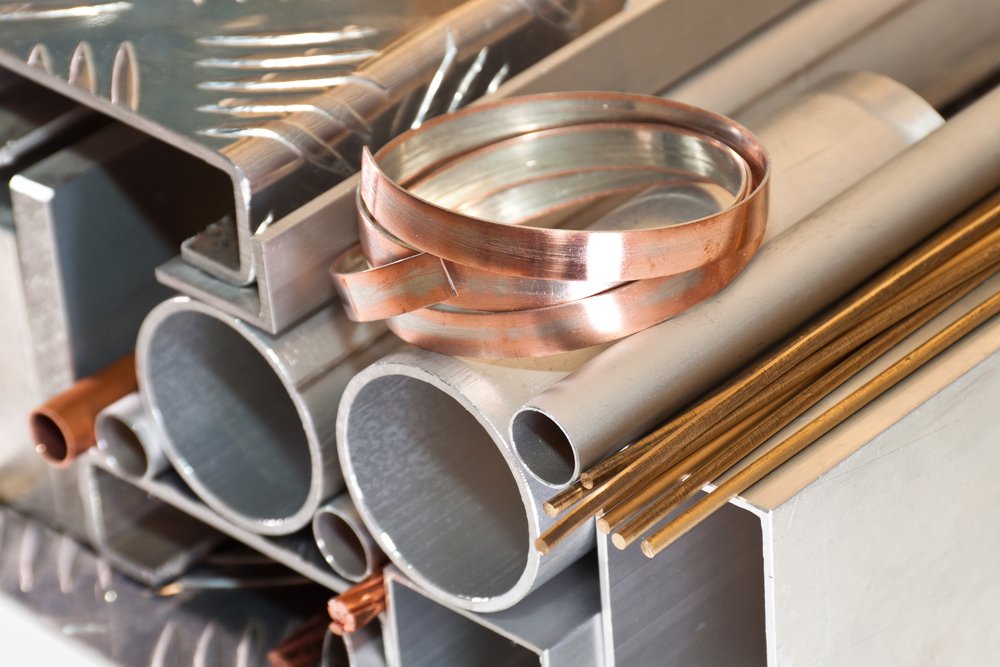Ferrous Metals
Ferrous metals generally contain iron. Run of the mill models incorporate designed materials, for example, steel and cast iron, consolidating an iron base with modest quantities of different metals or components included.
Ferrous metals are effectively distinguished by their magnetic properties, just as their poor protection from erosion and rust. There are just a couple of special cases to this standard, as on account of fashioned iron (made impervious to rust because of the incorporation of tempered steel in its creation).
Examples of Ferrous Metals:
- Alloy steel
- Carbon steel
- Cast iron
- Wrought iron
These ferrous metals are easily recycled. Carbon steel is a typical ferrous metal that is widely recycled and reused.
Characteristics of Ferrous Metals:
Ferrous metals incorporate gentle steel, carbon steel, tempered steel, cast iron, and created iron. These metals are principally utilized for their elasticity and solidness, particularly mellow steel which assists hold with increasing the tallest high rises and the longest scaffolds on the planet. You can likewise discover ferrous metals in lodging development, modern holders, huge scale funneling, vehicles, rails for railroad and transportation, most apparatuses and equipment you use around the house, and the blades you cook with at home.
Because of the high measures of carbon utilized when making them, most ferrous metals and composites are defenseless against rust when presented to the components. While this isn’t valid for created iron, which is so iron unadulterated that it opposes oxidation, or tempered steel, which is secured on account of its high chromium content, it’s a decent general guideline that on the off chance that you see rust, it is a ferrous metal.
Most ferrous metals additionally have attractive properties, which makes them exceptionally helpful in the formation of enormous engines and electrical machines. The reason you can track your child’s artwork to the refrigerator with a magnet with the local pizza place’s phone number on it? Ferrous metal.
In particular, ferrous metals make up the most reused materials on the planet. In 2008 alone, 1.3 billion tons of steel were delivered, and 500 million tons of that was produced using scrap materials. Be that as it may, we’ll get to for what reason that is significant somewhat later.
Non-Ferrous Metals
In metallurgy, a Non-Ferrous Metal is a metal, including amalgams, that doesn’t contain iron (ferrite) in calculable sums.
For the most part more exorbitant than ferrous metals, non-ferrous metals are utilized in view of alluring properties, for example, low weight (for example aluminum), higher conductivity (for example copper), non-attractive property or protection from consumption (for example zinc). Some non-ferrous materials are likewise utilized in the iron and steel ventures. For instance, bauxite is utilized as motion for impact heaters, while others, for example, Wolframite, Pyrolusite and Chromite are utilized in making ferrous combinations.
Significant non-ferrous metals incorporate aluminum, copper, lead, nickel, tin, titanium and zinc, and combinations, for example, metal. Valuable metals, for example, gold, silver and platinum and extraordinary or uncommon metals, for example, cobalt, mercury, tungsten, beryllium, bismuth, cerium, cadmium, niobium, indium, gallium, germanium, lithium, selenium, tantalum, tellurium, vanadium, and zirconium are likewise non-ferrous.They are generally gotten through minerals, for example, sulfides, carbonates, and silicates. Non-ferrous metals are generally refined through electrolysis.
The Characteristics of Non-Ferrous Metals
Non-ferrous metals incorporate aluminum, metal, copper, nickel, tin, lead, and zinc, just as valuable metals like gold and silver. While non-ferrous metals can give quality, they are essentially utilized where their disparities from ferrous metals can give a preferred position.
For example, non-ferrous metals are considerably more flexible than ferrous metals. Non-ferrous metals are additionally a lot lighter, making them appropriate for use where quality is required, yet weight is a factor, for example, in the airplane or canning enterprises. Since they contain no iron, non-ferrous metals have a higher protection from rust and consumption, which is the reason you’ll discover these materials being used for drains, water channels, material, and street signs. At last, they are likewise non-attractive, which makes them ideal for use in little gadgets and electrical wiring.
To the extent reusing goes, aluminum is the third most reused material on the planet. Be that as it may, numerous other non-ferrous materials like copper, metal and lead are moderately rare, and metallurgists depend vigorously on scrap material reusing to make new ones.
The Difference in Pricing
Regardless of whether you’re an individual scrap collector or a huge organization creating scrap through development or destruction, odds are you’re keen on auctioning that metal off. So what would you be able to expect with regards to the value you’ll get for your materials?
Generally, ferrous piece metals will in general be in great stock, so the costs will in general be lower than most non-ferrous metals. Since steel and iron compounds are always being reused in high volume everywhere throughout the globe, the costs for these materials remain genuinely consistent on a month-to-month premise, dropping or raising just somewhat.
Non-ferrous piece, as we referenced previously, are fairly harder to drop by and increasingly hard to make. This makes the interest higher, which drives up the value per pound higher than ferrous metals. While aluminum costs don’t vary frequently because of reusing endeavors, others like copper and metal can change radically in only a month’s time contingent upon the requirements of the market.
In case you’re an individual hoping to sell scrap, it’s in every case best to check with a scrap-seller in your general vicinity to discover what costs they’re offering before you carry your materials to the yard.
If you have an industrial, commercial, or demolition business, contact your scrap dealer and see if they’ll come out and assess your specific scrap situation. Not only will they help identify what you have, they should be able to provide an estimate for the collection and sale of your ferrous or non-ferrous materials.



 WhatsApp Us
WhatsApp Us